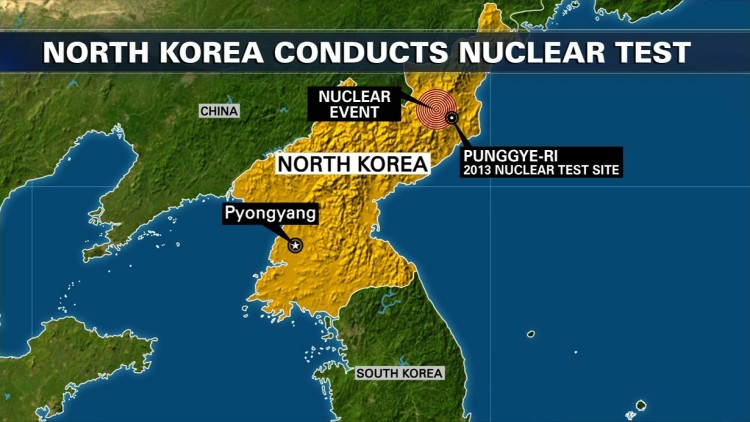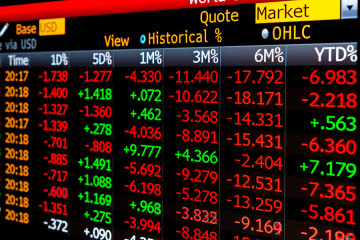Trump Warns North Korea of `Fire and Fury’ as Tensions Rise

(Bloomberg) —President Donald Trump ratcheted up his rhetoric against North Korea to an unprecedented level Tuesday, warning Kim Jong Un’s regime will face a devastating military strike if it continues threatening the U.S.
North Korea best not make any more threats to the United States, Trump told reporters in Bedminster, New Jersey. They will be met with fire, fury and, frankly, power the likes of which this world has never seen before.
Trump’s comment came as North Korea, reacting to new UN sanctions against its rapidly developing nuclear weapons program, warned the U.S. it would pay dear for its crimes and said it was examining its plans to strike the American military base of Guam with a missile. It also followed a report in the Washington Post, citing a Defense Intelligence Agency analysis, that Pyongyang successfully developed a nuclear warhead that could fit onto its missiles.
He has been very threatening, beyond a normal statement, Trump said of Kim. North Korea has routinely used bombastic rhetoric to threaten the U.S., including military bases in Japan, South Korea, Guam and Hawaii.
It wasn’t clear whether the president consulted with key allies, the Pentagon or State Department before making his comment. It was also unclear whether Trump’s fire and fury threat meant an overwhelming conventional strike or the use of nuclear weapons.
The Defense Department didn’t offer an explanation. We remain prepared to defend ourselves and our allies and to use the full range of capabilities at our disposal against the growing threat from North Korea’s Johnny Michael, a Pentagon spokesman, said in an email.
Startling Markets
Global powers and financial markets have long been accustomed to over-the-top rhetoric from North Korea, but the U.S. has traditionally taken a more diplomatic stance. Trump’s comments signaled a dramatic change in that approach, startling markets and prompting a renewed focus on the narrowing list of military and economic options at the U.S.’s disposal.
The S&P 500 Index fell to session lows Tuesday, and the CBOE Volatility Index jumped 11 percent after Trump spoke. The comments jolted markets from a summer slumber, with U.S. assets largely little changed for most of the session. The 10-year Treasury yield rose. Crude retreated toward $49 a barrel.
South Korea’s benchmark Kospi index opened lower and fell as much as 0.8 percent and Japan’s Topix index declined 0.4 percent as the yen strengthened after Trump’s comments Tuesday. Asia’s MSCI Asia Pacific Index shrugged off market concerns and was little changed at the open.
North Korea’s reported progress on miniaturizing nuclear warheads, coupled with two test flights of intercontinental ballistic missiles in July, are adding to the pressure on Trump, who vowed during last year’s presidential campaign that North Korea wouldn’t develop a nuclear warhead capable of reaching the U.S.: won’t happen, he wrote on Twitter.
Now, Trump may have decided it was time to strongly signal to Kim that U.S. patience is running out.
In doing so, Trump runs the risk of entrapping” himself in his own rhetoric, said Scott Snyder, director of the program on U.S.-Korea policy at the Council on Foreign Relations. If he pursues that, it’s hard for me to see how it can accomplish anything positive” he said.
Senator John McCain, the Republican chairman of the Senate Armed Services Committee, said Trump needs to be more cautious in his statements because he may not be able to make good on the implied threat.
The great leaders I’ve seen don’t threaten unless they’re ready to act, and I’m not sure President Trump is ready to act, McCain said in an interview on Phoenix radio station KTAR.
Classic Trump
McCain said he didn’t know how seriously to take the president’s warning. It’s the classic Trump in that he overstates things.
Representative Eliot Engel, the top Democrat on the House Foreign Affairs committee, said Trump’s latest comments undermined American credibility by drawing an absurd red line.
Kim’s efforts to develop a missile capable of delivering a nuclear weapon to the continental U.S. still face significant technological hurdles. Air Force General Paul Selva, vice chairman of the Joint Chiefs of Staff, highlighted those issues in an Aug. 3 presentation. They include developing a missile that can survive reentry into the atmosphere and a guidance-and-control system capable of directing a rocket all the way to the U.S. without breaking up.
The missile tests show Kim’s regime making important progress. Trump’s comments may be emotional rhetoric expressing unhappiness with what had gone on over past 10 years, said Paul Bracken, a professor of political science and management at Yale University and author of “The Second Nuclear Age: Strategy, Danger, and the New Power Politics.”
Just days ago, Trump was praising the United Nations Security Council’s unanimous decision to tighten sanctions on North Korea, targeting about $1 billion of the nation’s approximately $3 billion in exports. Some analysts say those measures are too little, too late to slow Kim’s momentum.
Today North Korea became only the third U.S. adversary, after Russia and China, to attain the ability to threaten nuclear war against the United States, said Matthew Kroenig, a nonresident senior fellow with the Brent Scowcroft Center on International Security at the Atlantic Council, referring to the Defense Intelligence Agency report. This news will likely provide motivation for the Trump administration to take a hard look at higher-risk options, including military force.”
Kim shows no sign of being cowed by condemnation or threats. The regime has long viewed its nuclear weapons program as a means to winning respect and ending any potential threat to oust the Kim dynasty, which has ruled the nation for three generations.
We will, under no circumstances, put the nukes and ballistic rockets on negotiating table, the state-run Korean Central News Agency reported on Monday. Neither shall we flinch even an inch from the road to bolstering up the nuclear forces chosen by ourselves, unless the hostile policy and nuclear threat of the U.S. against the DPRK are fundamentally eliminated.
Tillerson’s Travels
Trump’s latest statement comes as Secretary of State Rex Tillerson continues visiting allies in Southeast Asia, rallying support for tougher measures against Pyongyang and holding out an olive branch to the reclusive regime as well. Tillerson was in Thailand Tuesday and heads to Malaysia before returning to the U.S.
And we hope, again, that this ultimately will result in North Korea coming to the conclusion to choose a different pathway, and when the conditions are right that we can sit and have a dialogue around the future of North Korea so that they feel secure and prosper economically, Tillerson told reporters in Manila on Aug. 7.
Chinese Foreign Minister Wang Yi echoed Tillerson, saying the UN sanctions are intended to effectively block the DPRK’s nuclear development process, using an acronym for North Korea. The purpose is to pull the peninsula nuclear issue back to the negotiating table, and to seek a final solution.
The focus on sanctions has continued because the military options are all so grim. Seoul’s 10 million residents live just 35 miles (56 kilometers) south of the border — well within North Korea’s artillery range.
Pentagon War Games
Among the war-game scenarios at the Pentagon’s disposal are an airstrike using precision-guided munitions, launched from submarines or stealth aircraft, against the Yongbyon nuclear reactor facility, where North Korea has produced plutonium for its bombs.
Another option would be an attack on facilities at Punggye-ri, the mountainous site in the northeastern part of the country where previous underground nuclear tests have been conducted. Evading radar, B-2 bombers built by Northrop Grumman Corp. could drop a bunker buster bombs to try to do the most underground damage.
None of that would likely save Seoul, even with South Korea’s defensive capabilities as well as a newly installed U.S. missile defense system known as Thaad.
“We are not going to stop North Korea said Bracken. There is no alternative. Maybe 10 years ago we could have but it is too late now. Instead we have to learn to live with North Korea as a nuclear power.






No Comment